The content of the article
Everyone sweats - this is absolutely normal. Thus, the body tries to normalize the temperature of the body so that it is comfortable to be in the environment. Most often, excessive sweating is observed in the area of the feet, armpits and palms. However, sometimes a person sweats just like that - without physical exertion or stressful situations. This phenomenon is called hyperhidrosis and is associated with disturbances in the body. Why excessive sweating of the legs occurs, what diseases this symptom may testify to and how to deal with hyperhidrosis - we will try to understand this article.
Why feet sweat
Of course, the legs will be sweaty after wearing warm shoes in hot weather or after running. However, why are your feet sweating even in open shoes that you wear on the weather? Here are some of the most common causes of hyperhidrosis.
- Feet often sweat if shoes, stockings or socks are made of synthetic material. Such tissues do not allow air to pass through, moisture from the surface of the skin simply cannot evaporate.
- The shape of the shoe also plays an important role. If the shoes are narrow and uncomfortable, they heal the feet in an unnatural position, preventing the natural circulation of air.
- If you wear thick socks in warm weather - this can also cause excessive sweating.
- Inadequate hygiene is the most common cause of unpleasant foot odors.
- Excessive sweating of the legs is a professional disease of athletes. Their body is used to living constantly in serious stress, so even slight physical activity forces the body to produce a protective reaction in the form of excessive sweating of the feet.
- If all hygienic reasons are discarded, then the legs can sweat as well for various diseases. The most common is a fungus. If the nails and the skin of the feet are affected by the fungus, sweat appears, with a specific smell.
- Excessive sweating (not just stop) most often signals various malfunctions in the endocrine system.
- Often feet sweat from representatives of such professions as hairdressers, cooks, sellers. That is, those who are on their feet all day long.
- Legs often sweat with VSD.
- Some infectious diseases are also manifested by sweating of the legs, for example, syphilis, HIV, tuberculosis.
- Often the legs sweat during the period of hormonal changes in the body, which can be observed during puberty, before the menstrual cycle, during pregnancy and menopause.
- Some drugs (antidepressants, drugs to lower blood pressure) have such a side effect as excessive sweating.
Very often, increased sweating is a hereditary factor. As a rule, such a problem can be observed in relatives. In this case, you need to carefully monitor the hygiene of the legs.
Hygiene - the basis of the fight against sweating feet
Sweating feet is most often a temporary problem - due to improper shoes or underwear. To get rid of hyperhidrosis, you need to follow some hygiene rules.
- Every day, change socks, stockings and tights for fresh ones. In no case do not wear yesterday’s pair of socks, even if it seems to you that they don’t smell at all. Choose linen from natural fabrics - cotton, linen.
- In the morning and in the evening you need to wash your feet with a simple laundry soap. After washing, dry them thoroughly before putting on shoes. Have a separate foot towel.
- With heavy sweating, before shod shoes, you can treat the feet with baby powder with antiseptic components.
- Make contrast foot baths to accustom your skin to temperature differences. First, keep your feet in a basin of cold water, and then with warm water. Or water your feet with a contrast shower.
- Shoes should be breathable - legs should “breathe” in it. Buy shoes by size - they should never be cramped.
- Do not put your shoes on your bare foot - in this case, excessive sweating you can not avoid. The only exceptions are sandals and sandals with holes for air circulation. Women's shoes can be worn with small footsteps that are worn only on the foot and are completely invisible.
- Shoes should be dried after daily wear. The insoles also need to be removed and dried separately.
This is the necessary minimum that you can do yourself in the fight for clean and dry feet. If you adhere to all the rules of hygiene, and sweating does not stop, you must definitely see a doctor for examination. This can often be a symptom of a serious illness.
How to treat hyperhidrosis
If you have been diagnosed with this, you don’t need to be upset. In many cases, hygiene, taking medication and folk remedies can cope with this problem. However, for an effective result, you need to act in a comprehensive manner. Here are some ointments that can help solve the problem of excessive sweating in the legs.
- Formagel. This is one of the most effective and beneficial anti-sweating gels. It is an antiseptic and disinfectant that inhibits the work of sweat glands. It is also used to prevent fungal diseases. The gel should be applied to clean and dry skin of the feet. After just one application, you will feel that sweating has stopped. The effect lasts for several weeks.
- Formidron. Another fairly effective remedy that has an unpleasant odor. It is made in the form of a liquid, which must be applied with a swab to the feet once a day every evening for 4 weeks. Formidron has antiseptic properties, inhibits the development of bacteria, and also blocks the work of the sebaceous glands.
- Pasta Teymurova. This is a time-tested drug that does not lose its relevance. You need to apply the paste strictly on clean skin, in contact with greasy fat, the paste will not give the desired result. The tool is applied 1-3 times a day, depending on the intensity of perspiration. The paste is able to suppress not only increased sweating, but also an unpleasant odor.
- Salicylic-zinc paste. This is a good remedy against sweating feet and various skin diseases. After one application, the paste eliminates unpleasant odors, and after 3 applications it eliminates excess moisture on the feet - it dries and deodorizes.
- Sedatives. Agents such as Belloid and Bellataminal have a calming effect. They act on the nervous system, inhibit the activity of the sebaceous glands, are not addictive. Used internally - made in the form of tablets.
In addition to external treatment, sometimes hyperhidrosis is treated with physiotherapy. The work of sweat glands can be normalized by iontophoresis, UHF currents and diathermy. In addition, you can wipe the feet with a solution of alum and tannin. They contain special acids that dry the skin. Alcohol solutions of lead and zinc are very effective. It is also useful to warm your feet in the sun - sunbathing helps to normalize the work of sweat glands, ultraviolet light kills germs and dries the skin.
In complex cases, surgical treatment is used to suppress hyperhidrosis. During the operation, the sweat glands are either completely removed or they are disconnected from the food - that is, the nerve endings cross. One of the modern methods of treating hyperhidrosis is the introduction of botulinum toxin under the skin, which inhibits the activity of sweat glands. Sometimes the problem is solved by laser exposure.It is not always possible to completely cure sweating of the legs, but it is quite possible to significantly improve the patient's life.
Folk remedies for sweating feet
In the piggy bank of home recipes, there are many effective remedies for sweating feet, which even experienced doctors do not neglect.
- It is very effective to make foot baths with a string and oak bark. For five liters of liquid, you need to take 8 tablespoons of the dried string and five tablespoons of chopped oak bark. Pour boiling water over the collection and close the lid. Let the broth brew for a couple of hours, and then lower your legs into a warm composition. Hold for at least 15 minutes, then remove and dry thoroughly. There are many tannins in the oak bark that have antiseptic properties. A series of kills bacteria, dries the skin.
- It is very good to make salt baths with bay leaves. A handful of lavrushki need to be poured with boiling water and cook over low heat for about half an hour. Then add 3-4 tablespoons of sea salt to the hot broth and wait until the liquid becomes comfortable for the skin. Keep your feet in the prepared bath for 10 minutes, and then rinse with clean water. This procedure is best done before bedtime.
- Apple vinegar and lemon juice will help get rid of sweating feet. The two components should be mixed in equal proportions and diluted with five parts of water. Wipe the feet with this compound in the morning and in the evening, after which do not rinse, but dry thoroughly with paper towels.
- Oak bark can be used not only as a bath preparation, but also in dry form. The crushed oak bark should be simply poured into socks at night and left until the morning. After 3-4 procedures, you will notice that your legs began to sweat much less.
- If there is an unpleasant odor in the feet that is not washed out by anything, rinse your feet with a weak solution of potassium permanganate. It will disinfect the feet and suppress the development of pathogenic bacteria, which are the source of stench.
- You can get rid of excessive sweating with boric acid powder. It must be rubbed into the skin of the feet - especially between the fingers, pour the remaining powder into the sock and put it on. Take off your socks and rinse your legs only in the morning.
- To get rid of the unpleasant foot odor that accompanies you throughout the day, you need to put a pair of birch leaves in your sock.
- A soda compress is very effective. Prepare a solution - a tablespoon of baking soda in a glass of warm water. Soak a clean piece of gauze in the solution and attach to the feet. Leave on for 5 minutes, and then change the cheesecloth to fresh. So you need to do 3-4 times. After 3 days of such procedures, sweating of the legs will noticeably decrease.
These simple tips will help you significantly improve the quality of your life, and at no particular cost. To get real results from baths and compresses, they should be done regularly!
Beautiful, well-groomed and clean legs are a real treasure that needs to be protected. If your feet began to sweat, do not neglect this problem, otherwise it will become more and more serious. Timely measures taken in the form of a trip to the doctor, hygiene and foot baths will help you protect your legs from sweating and unpleasant odors. Watch your body and it will repay your health!
Video: how to cure sweating feet (hyperhidrosis)


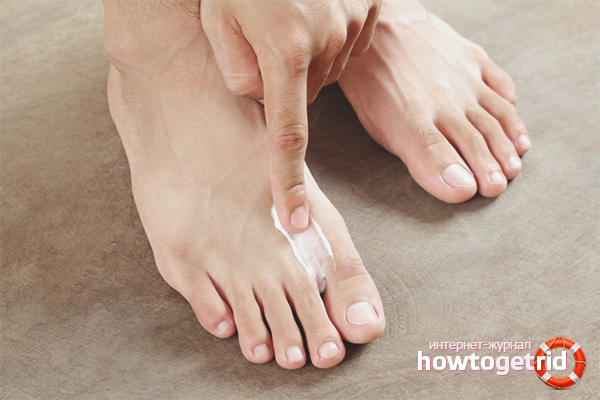
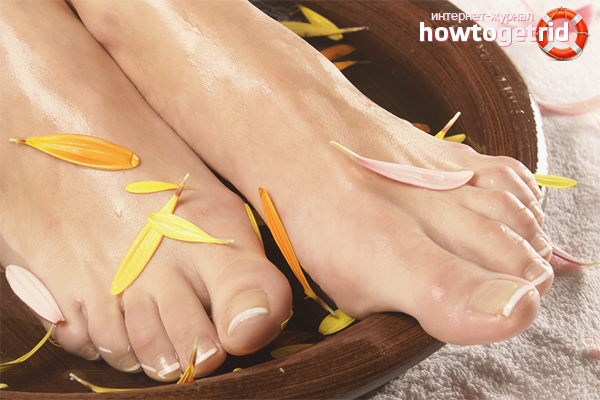
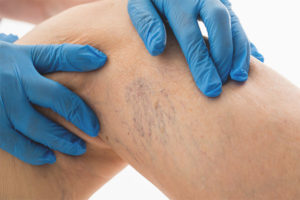

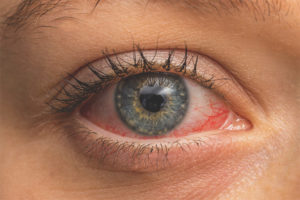



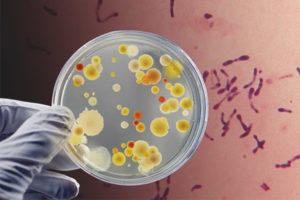

Submit